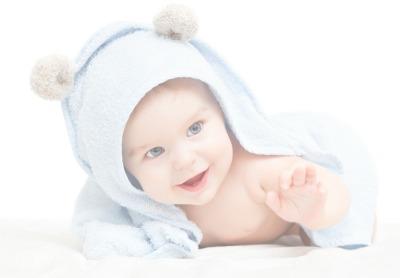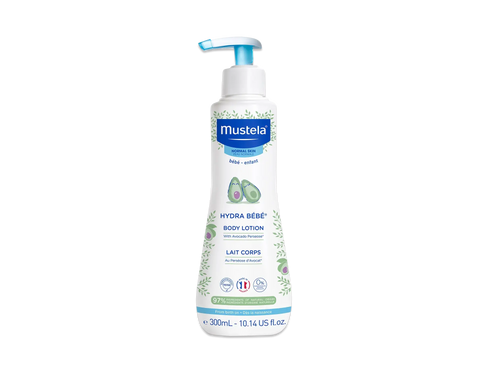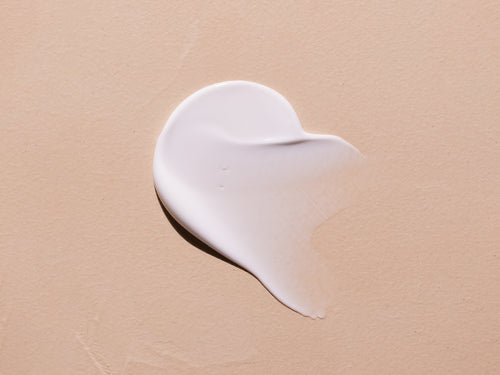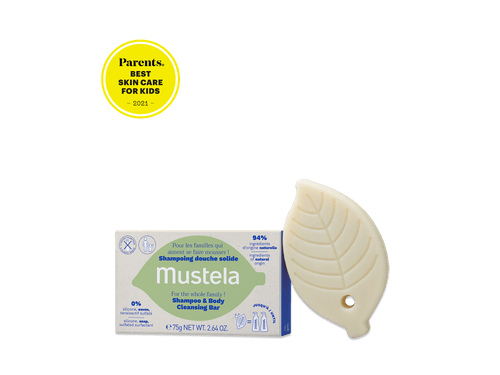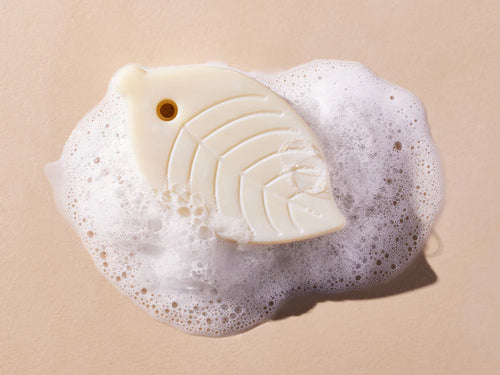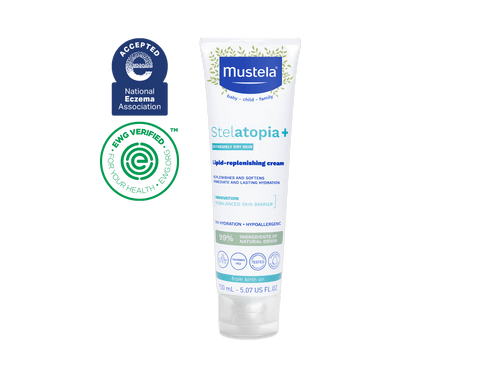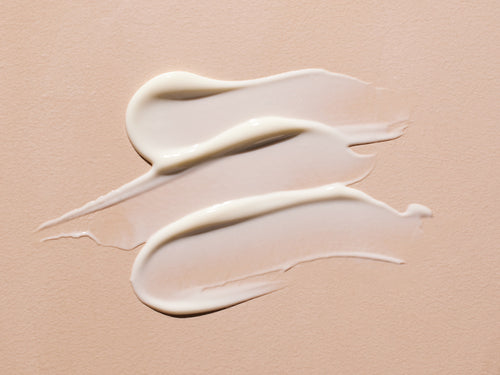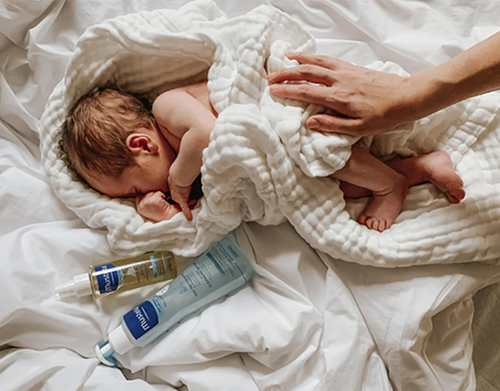You only just got home from the hospital, and already your little one is developing newborn dry skin. What’s going on? Is it something you did? Could this have been prevented?
The experts at Mustela are here to put your mind at ease and tell you everything you need to know to keep your baby happy, healthy, and comfortable during those first few days, weeks, and months.
In this article, we’ll answer the following questions:
- What is newborn dry skin?
- What causes newborn dry skin?
- Can you prevent newborn dry skin?
- Is newborn dry skin permanent?
We’ll also give you 10 tips to help you care for your newborn’s dry skin, so you and your little one can get back to enjoying your time together comfortably.
What Is Newborn Dry Skin?
Newborn babies get dry skin just like older children and adults. In fact, your little one’s skin may develop dry, flaky patches within a few hours after birth. Newborns are especially susceptible to dry skin because their skin is so delicate.
In addition to flakiness, newborn dry skin can also present as rough patches, hard areas, and cracks in the skin. While these symptoms may sound troublesome, dry skin in babies is very common and usually easily treatable.
While patches of dry skin can appear anywhere on a newborn’s body, it’s most commonly seen on the face and folds of skin, such as the neck, wrists, elbows, and knees, so it’s a good idea to keep an eye on these areas.
What Causes Newborn Dry Skin?

Newborn Skin Shedding
One of the most common causes of newborn dry skin is your baby’s body adjusting to life outside the womb. Your little one lived in liquid for the past nine months, so their skin cells were not able to flake off like ours do.
Now that your newborn has come into the world, their skin is making up for lost time by shedding its top layer as it’s exposed to dry air for the first time. This is all part of the process of your little one creating a new protective layer of skin so they can best prepare for the world.
As you may have guessed, this process presents itself as dry, flaky skin. This is completely normal, painless, and usually resolves within just a few weeks, so there’s no need to worry.
New Hormones
Another cause of newborn dry skin is your baby’s body adjusting to new hormones. For nine months, your little one relied on your hormones. Now your baby’s body has to start producing its own.
The change in hormone quantity and concentration often leads to newborn dry skin. In fact, you may have developed dry skin while you were pregnant because of a similar process.
This is all part of your little one’s journey into the outside world and is no cause for concern.
Bathing Too Frequently
Bathing your little one too frequently or in bathwater that’s too hot can also cause their skin to dry out easily, as it strips moisture from their skin.
Newborns don’t need to be bathed every day, particularly when it’s cooler outside. Two to three baths per week are more than enough to keep your baby clean and healthy.
Try to keep baths between five and 10 minutes with bathwater that’s warm, not hot — aim for around 97°F to keep your little one comfortable.
Additionally, to counteract the drying effects of bathtime, try adding a hydrating product, like our Certified Organic Hydrating Cream with Olive Oil and Aloe, to their routine.
Using Harsh Products
Using bath and skin products with harsh ingredients that can cause irritation is another common trigger for newborn dry skin. This is all part of the learning curve that comes with having a new baby!
It’s best to stick to natural products that have been specially formulated for delicate newborn skin to avoid drying out and further irritating your baby’s skin. We’ll go into all the details of what to look for and what to avoid later in this article.
Atopic Dermatitis (Eczema)
Atopic dermatitis (or eczema, as it’s more commonly known) is a genetic skin condition that can affect newborns, older children, and adults alike. In little ones, it’s most often seen between birth and three months.
Eczema causes the top layer of your baby’s skin to become thin and break down in certain areas. This allows crucial moisture to escape and allergens to come into contact with the deeper layers of the skin.
So how can you tell if your little one’s dry skin is actually an eczema flare-up? If you notice red, scaly patches that seem to be itchy, particularly on their face, neck, or hands, your baby may be experiencing eczema.
It’s best to discuss these symptoms with your doctor to ensure your little one is the happiest and healthiest they can be. Your doctor will also be able to provide additional treatment options if needed to help your newborn feel their best.
In addition, treating your newborn’s eczema as soon as possible can help prevent future flare-ups, although the potential for recurring flares will always be present as there is no cure for this condition.
What About Cradle Cap?
You may have heard of cradle cap, but is it the same as dry skin? And what causes it?
While newborn dry scalp might look like flaky, peeling skin, cradle cap is a little bit different. If you notice rough, crusty bumps on your little one’s scalp that feel oily to the touch, what started as a simple dry scalp may have now progressed into cradle cap.
Researchers aren’t exactly sure what causes it, but thankfully, treatment is essentially the same whether your little one is experiencing this condition or simply has a dry scalp.
In addition to following the tips in this article, our Cradle Cap Cream can help moisturize and hydrate your little one’s scalp to treat and prevent cradle cap.
Is Newborn Dry Skin Permanent?
No, newborn dry skin is not permanent. Unless your child has inherited eczema from you or your partner, your newborn’s dry skin will eventually disappear. But that doesn’t mean you should ignore the problem and just wait for it to go away.
Newborn dry skin can be itchy and uncomfortable and, if not properly cared for, can even develop into an infection. By addressing your little one’s dry skin as soon as you notice it, you’re setting yourself up to successfully treat this common condition.
Can You Prevent Newborn Dry Skin?
The simple answer is no, you cannot always prevent newborn dry skin.
Because your newborn’s dry skin is often the result of your baby’s body adjusting to a new environment and new hormones, there’s not much you can do to stop it from happening. Your baby’s body simply needs time to adapt.
You can, however, keep your baby comfortable while they’re experiencing dry skin and ensure that it doesn’t get worse by following our expert tips listed below.
How To Care For Newborn Dry Skin
1) Moisturize Your Baby’s Skin

Applying a moisturizer is one of the most important steps you can take to care for your newborn’s dry skin.
Moisturizers like Mustela’s Nourishing Cream With Cold Cream are designed to lock moisture into your little one’s skin and prevent it from evaporating. This helps to keep your baby’s skin soft and supple and reduces itching.
Packed with natural, hypoallergenic ingredients, including coconut oil, sunflower seed oil, and shea butter, our Nourishing Cream protects your little one’s skin from environmental allergens while providing much-needed hydration.
We recommend applying a moisturizer at least twice per day: once during the day and once after bath time. If your baby’s skin looks and feels dry even with two applications per day, don’t be afraid to add a third or fourth.
And for busy parents and babies on the go, be sure to pack Mustela’s Hydra-Stick with Cold Cream in your diaper bag. This provides the same nourishment as our traditional cream in an easy-to-apply stick.
2) Dress Your Newborn In Loose, Soft Fabrics
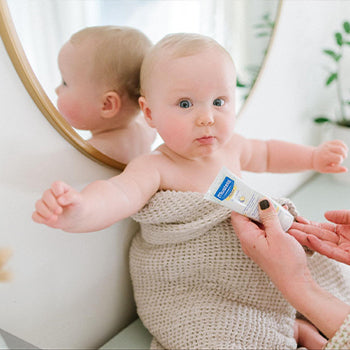
Dress your newborn in loose, soft fabrics to prevent their dry skin from becoming more irritated. Even well-moisturized skin can react badly to tight, rough fabrics. It is vital to choose clothing, blankets, sheets, and even plush toys that won't cause friction on your baby's delicate skin.
Try choosing cotton clothing when possible, like our Stelatopia Skin Soothing Pajamas. Specially designed for babies with dry or eczema-prone skin, these pajamas provide soothing comfort all night long.
It’s also important to avoid using harsh detergents and softeners when washing your baby’s clothing and bedding. Instead, opt for natural products to avoid irritating your little one’s already dry skin.
3) Protect Dry Skin During Bath Time
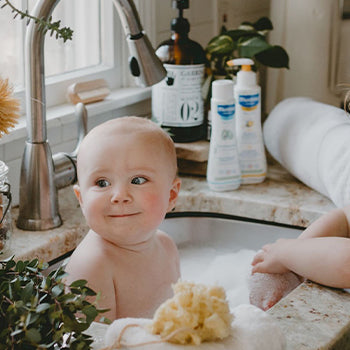
Even if your baby doesn’t suffer from newborn dry skin, bath time can cause your little one’s skin to develop itchy, flaky patches. Luckily, you can protect your baby’s skin during bath time by remembering three simple rules:
- Fill the tub with lukewarm water, around 97°F.
- Keep baths short (no longer than 10 minutes).
- Use the right bath products.
It’s this last point that can make the biggest difference. We recommend adding Mustela’s Stelatopia Cleansing Oil to your baby’s bathwater to prevent dissolved salts and chlorine from drying out their skin.
Once your little one is in the bath, gently wash them with Mustela’s Nourishing Cleansing Gel With Cold Cream or our Gentle Soap With Cold Cream to preserve their tender skin.
Both of these products thoroughly cleanse and nourish without overdrying your little one’s skin, so you can’t go wrong with whichever you choose!
It’s also important to opt for a natural baby shampoo to avoid dryness on your newborn’s scalp. Our Foam Shampoo for Newborns is specially designed to cleanse your baby’s scalp and hair while reducing flakiness through gentle exfoliation.
Like all Mustela products, our Foam Shampoo is packed with naturally derived ingredients and is free from parabens and fragrances to ensure the safest products for you and your baby.
And remember, after bath time, it’s best to add a generous amount of moisturizer to your newborn’s skin to lock in hydration and aid in healing any dry patches. (Our Nourishing Cream With Cold Cream is our favorite!)
4) Add Moisture To The Air
If the air in your home is dry, add moisture by running a vaporizer or humidifier. The extra moisture in the air will prevent the moisture in your baby’s skin from evaporating too quickly.
For warm moisture, a vaporizer works best. For cool moisture, we suggest purchasing a humidifier. Ideally, your home’s humidity level should be between 40 and 60 percent.
5) Treat And Prevent Dryness In Your Baby’s Diaper Area

Your baby’s diaper area is especially susceptible to dry skin because of all the activity going on down there! Diaper changes can be a lot for newborn skin to handle, so it’s important to give the skin some extra TLC with gentle products.
After using our Cleansing Wipes, reach for Mustela's Liniment to cleanse and soothe baby’s delicate skin. This creates a moisture barrier that provides long-lasting hydration between diaper changes.
After your little one is all cleaned up, use our Diaper Rash Cream 1 2 3 to relieve and recover your baby’s skin. This 3-in-1 product helps soothe irritated skin and prevent diaper rash, leaving your baby with smooth, moisturized skin.
We also recommend our Diaper Cream with Olive Oil and Aloe. This easy-to-apply formula is EWG (Environmental Working Group) Verified and soothes and diminishes redness at every diaper change.
Our Certified Organic Cotton Wipes with Water are also great for cleaning and caring for delicate newborn skin.
All of Mustela’s products are clinically tested to be hypoallergenic and safe for use on newborns, babies, and children alike. So don’t be afraid to use our products on your whole family!
6) Keep Your Newborn Hydrated

Whether you’re breastfeeding or bottle-feeding, you can care for your newborn’s dry skin by keeping them well hydrated.
The liquids your baby drinks will provide moisture from the inside out, while the moisturizer you apply twice per day will help keep the hydration from evaporating out of your baby’s skin.
Ensure you and your little one establish a good feeding schedule to make sure they’re getting enough hydration and nutrients. You’ll know your newborn is well hydrated by the number of dirty diapers they produce — between four and six per day is ideal.
While you’re tracking your newborn’s schedule, don’t forget to care for yourself, too! If you’re breastfeeding, that means taking care of your skin with our Nursing Comfort Balm.
7) Keep Your Baby Clean And Comfortable Between Baths
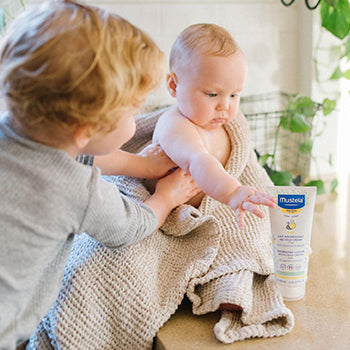
Dirt, dust, and pet dander can irritate your baby’s dry skin, so it’s vital that you keep your little one clean and comfortable between bath times with a cleansing product that won’t further dry out their skin.
We recommend our Certified Organic Micellar Water with Olive Oil and Aloe. It can be used any time to gently cleanse your baby’s face, body, hands, and diaper area without aggravating your little one’s sensitive skin.
For quick clean-ups, try Mustela's Cleansing Wipes. Perfect for even the most dry, sensitive skin, these wipes are ultra-soft and contain avocado extract to hydrate and moisturize your baby from head to toe.
8) Protect Your Baby From The Elements
Low temperatures, high temperatures, wind, and the sun can all make your baby’s dry skin worse. Protect their skin from the elements in the winter by covering your little one’s hands and head with gloves and a hat.
And whether it’s winter, spring, summer, or fall, you’ll need to protect your baby from the sun’s UV rays, which can further dry out newborn skin. These harsh rays are present all year round, which means your baby needs sunscreen any time they’re outdoors.
Protect your baby’s tender skin with Mustela’s SPF 50+ Broad Spectrum Mineral Sunscreen. This 100% mineral-based sunscreen provides broad-spectrum sun protection for your newborn’s face and body.
(Learn about the differences between mineral and chemical sunscreen here.)
Remember, however, that it’s important to keep your newborn from being exposed to the sun whenever possible. Always take the necessary precautions, such as staying in a shaded area with your baby, dressing them in long sleeves and pants, and avoiding peak sun hours.
9) Clip Your Baby’s Nails

Clip your baby’s fingernails to prevent your little one from scratching themselves and making their dry skin worse.
Dry skin is uncomfortable, and even adults (who should know better) can give in to scratching flaky areas once in a while. Your baby has none of the self-control that you do and may even scratch without meaning to.
That’s why it’s so important to keep your baby’s fingernails clipped to prevent intentional and accidental scratching. If you see red marks on your baby’s skin, even after clipping their fingernails, try putting some baby mittens on your little one’s hands.
10) Avoid Products That May Aggravate Already Dry Skin
To protect your baby’s sensitive skin and prevent further irritation, we recommend avoiding products that may aggravate it. Be on the lookout for:
- Powder-based products like talc and baby powder
- Products that contain alcohol
- Essential oils and products that contain essential oils
- Parabens
- Phthalates
- Phenoxyethanol
Instead, look for ingredients that are naturally derived and are less likely to cause a reaction in delicate newborn skin.
At Mustela, we only include the best ingredients in our products, so you can rest assured that your little one is well looked after. From avocado to sunflower oil, beeswax to olive oil, all of our ingredients are hypoallergenic and dermatologist-approved.
By sticking to natural products and avoiding nasty chemicals, you can set your newborn up for healthy, hydrated skin all year long.
Caring For Your Newborn’s Dry Skin
Don’t let your newborn’s dry skin make them uncomfortable! Solving their dry skin issues can be simpler than you might think.
Follow our tips above — such as keeping bath time short and sweet, adding hydration with moisturizer, and protecting your little one with sunscreen — to keep your baby happy and healthy. With a bit of extra care, your newborn’s dry skin will quickly become a thing of the past.
In addition, be sure to choose natural products for your little one to ensure their dry skin isn’t irritated. From our Nourishing Cream With Cold Cream to our EWG Verified Certified Organic skincare range, we can help soothe dry skin in no time at all!


